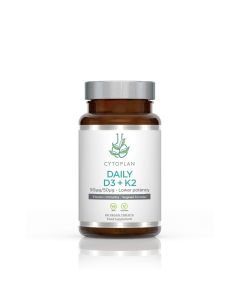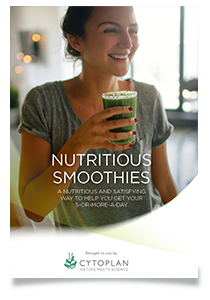Thyroid cells are the only cells in the body that can absorb iodine and the function of the thyroid gland is to convert iodine into thyroid hormones thyroxine (T4) and triiodothyronine (T3). T4 is produced from a molecule of tyrosine and four iodine molecules, which can then be converted to T3 (1 tyrosine and 3 iodine molecules). It is the hormone T3 that is biologically active and influences the activity of cells and tissues, controlling metabolic rate, growth and many other vital functions. The thyroid gland also contains high amounts of selenium, which contributes to normal thyroid function and is essential for the activity of the enzyme used to convert T4 to T3. Other minerals needed for this conversion include zinc, copper and manganese.
Despite its important role in health, iodine is one of the micronutrients known to be lacking in the diets of many. The richest natural sources of iodine come from ocean life - fish, shellfish, and seaweed, meaning that those who do not consume foods from the ocean are at a greater risk of iodine deficiency. Those who avoid dairy products may also be at increased risk. Kelp is the name given to a whole variety of seaweeds and contains large amounts of organic iodine and traces of other important minerals for thyroid health. Iodine cannot be stored in the body for a long period and so must be obtained regularly via the diet or supplementation.
There are many factors that can impact the health of our thyroid and so it is important to support its health to reduce the risk of a disorder developing. Hyperthyroidism is an overactive thyroid, meaning that the thyroid gland makes more thyroid hormones than the body needs. This can speed up the body's metabolism and lead to symptoms such as weight loss, increased heart rate and irritability. Conversely, hypothyroidism (low thyroid) is an underactive thyroid and occurs when the thyroid gland is not producing and secreting enough thyroid hormones. This is the most common thyroid condition, with symptoms that may include weight gain, fatigue, low mood and intolerance to the cold. Currently 5-10% of the population is diagnosed with hypothyroidism, however some experts estimate that between 25-40% of the adult population has suboptimal thyroid function.
At Cytoplan, we are committed to ensuring the highest quality formulations providing nutrients in their most bioeffective and natural forms. We have therefore developed our Thyroid Support supplement, which has been expertly formulated to provide key nutrients to support normal thyroid function. Seagreens® Ascophyllum nodosum is the organic kelp species that we use in this product, which is gentle and bioeffective and provides a natural source of iodine; it also has a broad spectrum of other important vitamins, minerals, amino acids and antioxidants. Studies demonstrate Seagreens® nutritional value to be higher than seaweeds of the same species from the same location.
Our kelp is rooted in the principles of sustainable food and biodynamic production and is guaranteed free from all impurities and pollutants. Research shows that it has a more prolonged and steadier uptake than potassium iodide (the common form of iodine in table salt), with no adverse effect on the thyroid.
We have also given careful consideration to other factors that can impact on thyroid health. A relationship between the thyroid gland and the adrenal glands is well established and factors such as stress and poor adrenal function have been found to interfere with thyroid hormone production, as well as inhibiting the conversion of T4 to T3. As part of our range, we therefore offer unique formulations containing a blend of herbs, phytonutrients and energy-supportive nutrients to help support adrenal function and hormone balance.
All of our thyroid health supplements are suitable for vegetarians and vegans. Please note that our Thyroid Support and Organic Kelp are not recommended for use if thyroid medication has been prescribed. They are indicated for sub-optimal thyroid function or non-medicated hypothyroidism.
What supplements in the range should not be taken with thyroid medication?
What are the best nutrients to support thyroid health?
Selenium - is a component of several selenoproteins that help to regulate thyroid hormone synthesis and protect the thyroid gland from oxidative stress. Good sources of selenium include seafood, Brazil nuts and cereal grains. Selenium is included in our Thyroid Support formula; we also offer a Food State Selenium supplement.
Iodine - contributes to the normal production of thyroid hormones and normal thyroid function. Seafood, sea vegetables and dairy contain iodine, so vegans in particular may need to be mindful of intake. Our organic kelp is a natural and bioeffective source of Iodine and is included in our Thyroid Support formula and Organic Kelp supplement. Please note that these products are not recommended for use if thyroid medication has been prescribed.
Manganese - is a component of the enzyme thyroxine oxidase, which is necessary for the production of thyroid hormones. Sources include wholegrains, nuts and legumes. This is included in our Thyroid Support formula.
Magnesium - plays a vital role in maintaining thyroid functionand is involved in the formation of thyroid-stimulating hormone. Magnesium can be found in a wide range of fibre-rich foods such as wholegrains, vegetables, nuts and seeds.
Zinc - is required for the synthesis of thyroid stimulating hormone. In addition, zinc is needed to convert T4 into T3. Sources of zinc include a range of protein-rich foods such as poultry, eggs and seafood as well as wholegrains and dairy products.
Iron - is a component of the enzyme thyroid peroxidase, which catalyses steps in thyroid hormone production. Sources of iron include red meat, dark green leafy vegetables and beans.
Protein - adequate protein intake provides the amino acid tyrosine, and other essential amino acids which provide the building blocks to produce thyroid hormones.
What does iodine contribute to?
Iodine contributes to the maintenance of normal skin. It also contributes to normal:
- production of thyroid hormones and normal thyroid function
- cognitive function
- energy-yielding metabolism
- functioning of the nervous system
- growth of children








